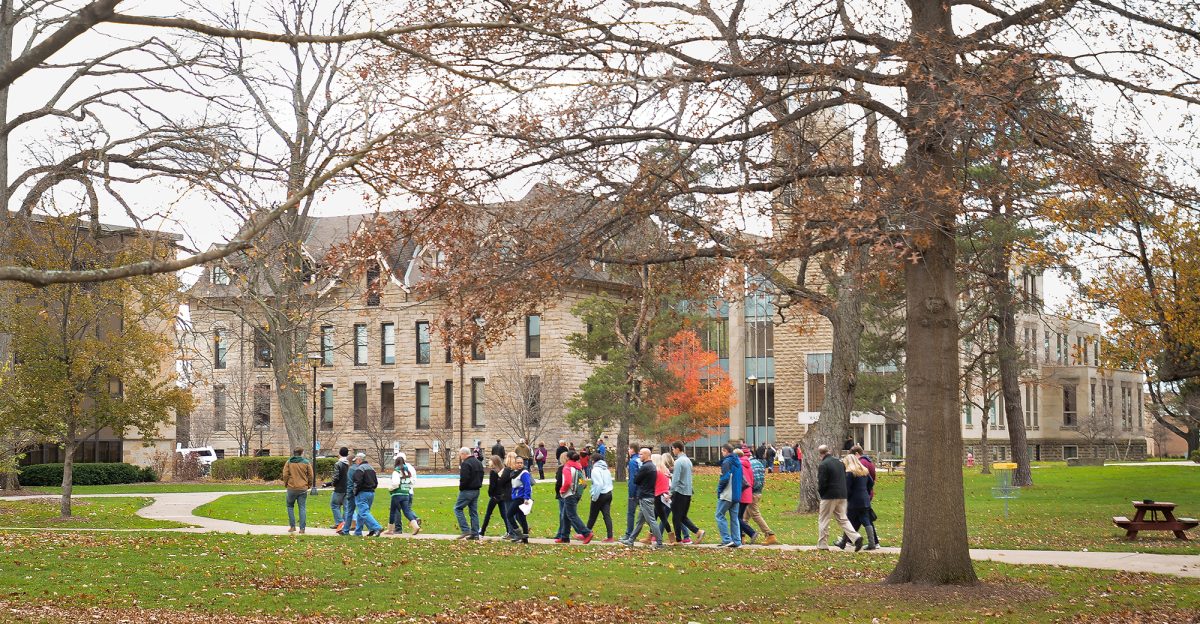The 2023 Faculty Research & Scholarly Activity Showcase took place in Knowlton Center on Oct. 26, enabling professors to share their knowledge and expertise with the BW community in an interactive way.
Associate Professor of Neuroscience Clare Mathes said her project put forth the concept of “applying research projects that faculty partake in to the classes that they teach.”
“My project is integrating my research in behavioral neuroscience into my behavioral neuroscience class, so I’m incorporating authentic research into it”, Mathes said.
This concept of inclusion of relevant data in classrooms was further supported by the Dean of Graduate Studies, Swagata Banik, who discussed the importance of faculty being able to do research studies and include students in them.
Banik said: “[Faculty-Student collaboration] provides you as a student and us as a community with new knowledge about the topic, so that knowledge they bring to the classroom.”
Another benefit to students, as suggested by Provost Stephen Stahl, is the idea of seeing teachers in their element and talking about subjects they love.
“This gives students a chance to see the faculty talk about their academic passion,” Stahl said. “Teachers being able to continue their education in inclusive aspects allows for students to be encouraged to continue their own education.”
Huixin Deng, assistant professor of journalism in the Department of Communication Arts & Sciences and faculty advisor to The Exponent, presented her research on social media activism. In her study, Deng aimed to examine how Generation Z in the U.S. utilize short-form video platforms, such as TikTok, to advocate for contentious social issues.
Deng said since 2020, she had witnessed a trend of young Americans using TikTok for political expression and grassroot activism. Therefore, drawing from prior research in psychology, sociology and communication studies, Deng created an extended theory of planned behavior model to predict Gen Z’s intention and behavior to advocate for social justice on TikTok.
Deng said she found it “ironic” that the results of her study reveal an interesting phenomenon: using TikTok will motivate TikTok users to advocate for social issues on the platform, but this may keep them from helping the same cause offline, which indicates that the very act of TikTok activism is often the end – rather than the beginning – of Gen Z’s engagement with a cause, which undermines much of digital activism.
“I look forward to conducting more research as such in the future,” Deng said. “As a social science researcher, I aim to inform and provide theoretical and practical implications to media practitioners, policy makers and company shareholders.”
In addition to conducting her own research, Deng also advised students on their Ovation projects, during which she and her students investigated media-related research topics.
Despite her busy schedule, Deng remains active in research. She has published three peer-reviewed journal articles as leading authors and delivered six solo-authored presentations at national communication conferences since last fall, while currently having two manuscripts under review at top-tier communication journals.
“I simply enjoy learning and studying new things,” Deng said. “I started drafting my first research manuscript when I was in college, and I still do it every day.”
Matthew Webb, assistant professor and director of musical theatre from the Conservatory, presented his project on continuing the virtual showcase from the COVID era.
“We started doing a virtual showcase, just because we needed to do something and that made sense, but then it had such a drastic impact on the students being able to be showcased across the country, on the West Coast and then Canada and areas, we decided to keep doing even after reinstating the in-person showcase,” Webb said.
The virtual showcase was necessary during COVID, but eventually it turned into an opportunity for seniors at BW to showcase their talent across the country. His study thus shows how an adaptation would create a new opportunity for students, Webb said.
































